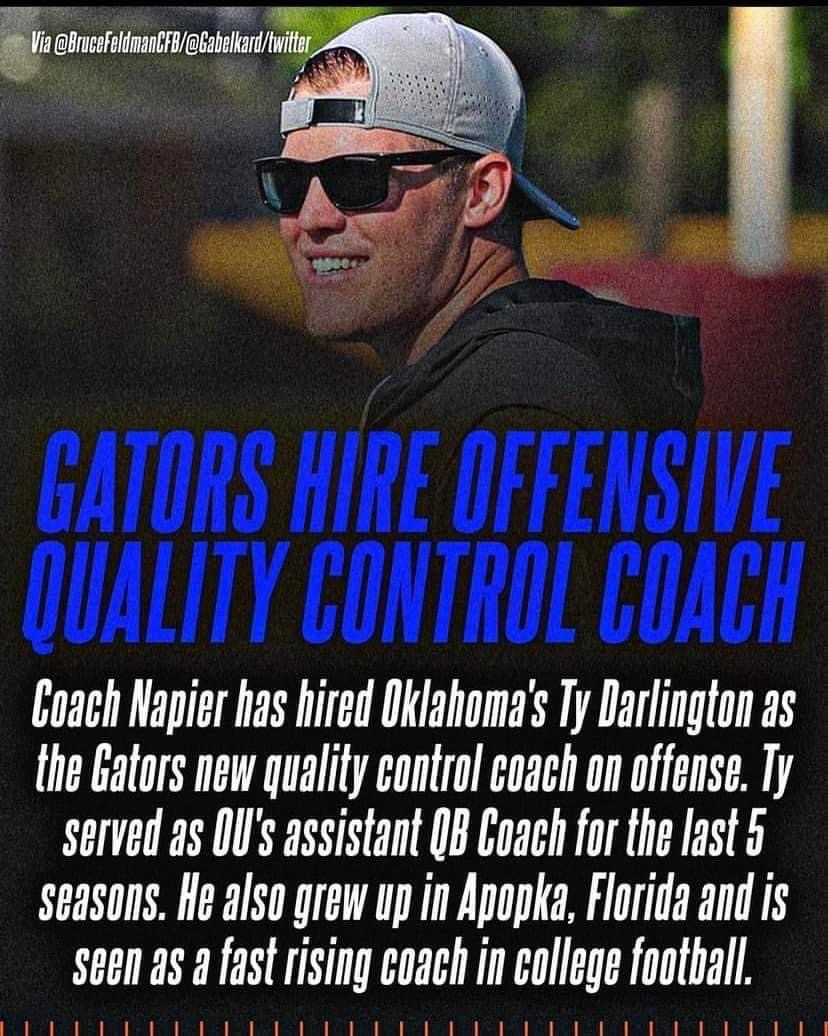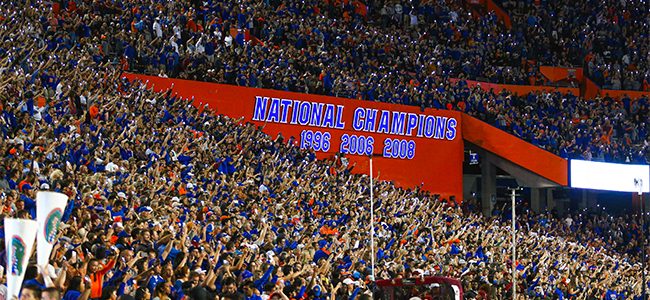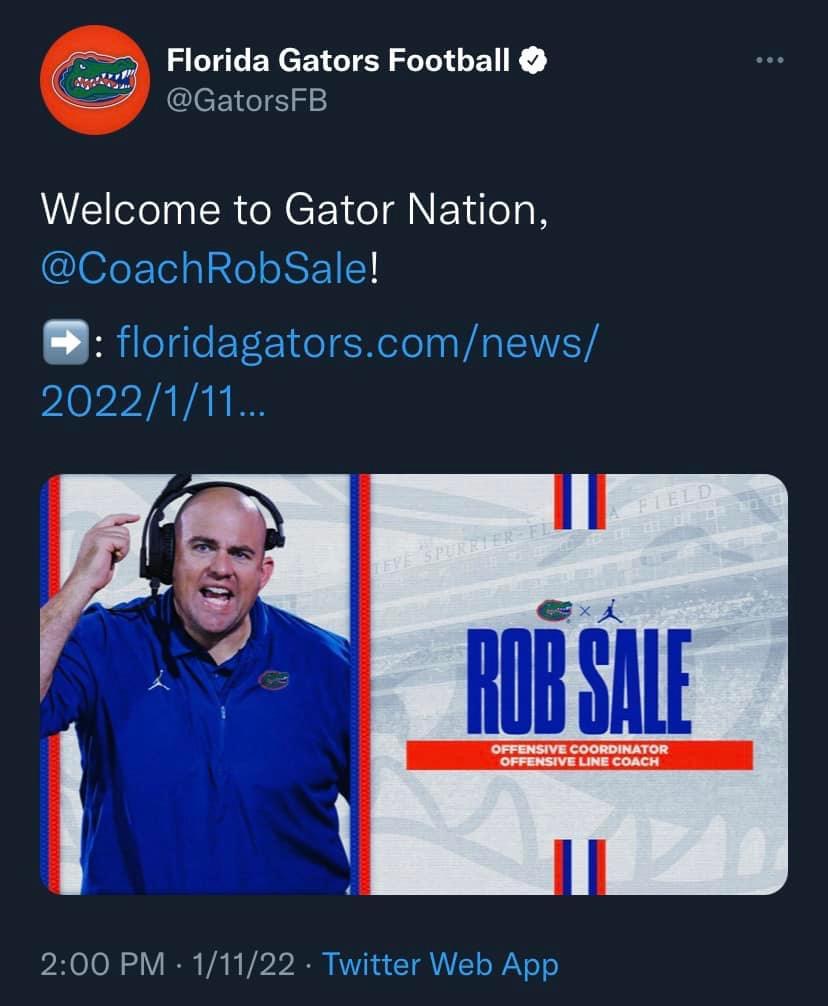After getting a late start on putting together the foundation for success at Florida, new head football coach Billy Napier is hitting the ground running. Hired in December away from Louisiana, Napier has spent weeks getting to know the players on his team, while finalizing a new staff. Through the first few weeks on the job, he has an idea on how he wants things to play out in Gainesville.
The most interesting part of this process for Napier has been getting a feel of the current roster, knowing that they could end up adding a few pieces over the next two weeks from the transfer portal. I am sure Napier and his staff have watched a tremendous amount of film on the current group, but that didn’t mean he wasn’t going to analyze them in his own way.
“I think we were fortunate to be able be around and observe bowl practice. We put players through evaluation workouts. We made profile tapes of every player returning on the team. I think we were able to wrap our heads around about the current team, where we’re at, positions of concern from depth perspective. Where is there a gap in depth? And then went out and acquired some players in some of those positions. Now there’s more to come.”
Napier mentioned potentially adding a few players to the team from the portal over the next 8 to 10 days, but he also knows the clock is ticking to get them in, before the academic calendar begins. He still looks at it as though he has three windows to add players to this roster.
“You’ve got the recruiting perspective. You’ve got a window to get them in now, and then kind of a sprint until February singing day. And then you have another opportunity to add some players prior to summer school starting. Three windows of time to add players, and certainly we’re working hard in all three of those areas.”
Besides finding prospects in the portal, this staff also has a quarterback room that is filled with potential. As we all witnessed last season, Anthony Richardson looks to be the type of player you could build an offense around, but with the addition of Jack Miller, there could be some tough competition. Oh, and Emory Jones, who most thought would be out of Gainesville by now, after entering the portal, is still on campus and enrolled in classes.
Napier made it clear that each player is getting a fresh start with this staff, and hopes that the fans can understand that their support is needed as these players start over, including Emory Jones.
“Emory’s here, in class, he’s participating. He’s done a fantastic job with all the things we’ve asked him to do. You know, I would hope our fans and all the people out there would understand what a big deal that is. This is a guy who is a class act. It’s been very impressive to me the caliber of person that he is. He’s managed a very difficult situation well. Anything that happened in the past, it’s important for not only the players, but all the people that care about the University of Florida, that care about our football program, to kind of separate those things.
“This staff has given each one of these players a new beginning, kind of a fresh start,” Napier added. “I think it’s important our fans do that. Emory, I think he cares about this place. It’s important to him to represent this place the right way.”
The newly hired staff has taken a different approach to getting to know the players, not just what they bring to the field, but off the field as well. The position coaches need to know what kind of situation they are in with their players, especially when it comes to the past culture that Dan Mullen had established. The atmosphere around the building had changed, more players being late for meetings or workouts, which undoubtedly set the tone for Mullen’s remaining time in Gainesville. Simply put, he had let loose of the reins a bit, which some people around the program took advantage of.
Now, Napier is looking to establish his principles on the program and continue building relationships with his new players. But, this comes with time, and getting athletes to buy into your system is never easy, but there is a plan for how this staff will go about this process. It starts with a 13-day approach to talking with each player on the roster, breaking down their film and understand what each person brings to the program.
“We’ve got to establish trust and communication with all the areas of the organization that work with the player, right. Some of those areas that I’ve talked about earlier, those come to the forefront this time of year right.
“But I think that we’ve had kind of a 13-day approach here. All these areas and meeting with the players, really taking an IDP approach, right, an individualized development plan. I think that’s an important part of what we do. In each one of these areas, we’ve hired really good people and they’re off to a good start.”
The beginning phase of construction starts on Tuesday, with the players reporting back and beginning winter workouts, along with class. For Billy Napier and this staff, the foundation will be poured and construction on the new program can begin.
“Our goal here is to equip the players. We’re trying to create habits that will help them in all parts of their lives as people, as students, as football players. I think that the way you change your future and you create a better future for yourself is doing the simple things that we’re talking about, right? This is for individual players and I think obviously that is going to affect us collectively as a group and a team. I’m sure you guys will have lots of questions about all these additions, and we can get into that but phase one, foundation, starts Tuesday. We look forward to that.”
Sounds like Billy Napier has a plan to build back the once great Florida program.



